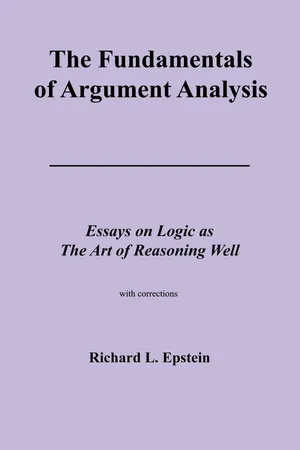
- 228 pages
- English
- PDF
- Available on iOS & Android
eBook - PDF
The Fundamentals of Argument Analysis
About this book
This series of books presents the fundamentals of logic in a style accessible to both students and scholars. The text of each essay presents a story, the main line of development of the ideas, while the notes and appendices place the research within a larger scholarly context. The essays overlap, forming a unified analysis of logic as the art of reasoning well, yet each essay is designed so that it may be read independently.
The question addressed in this volume is how we can justify our beliefs through reasoning. The first essay, "Arguments," investigates what it is that we call true or false and how we reason toward truths through arguments. A general theory of argument analysis is set out on the basis of what we can assume about those with whom we reason. The next essay, "Fallacies," explains how the classification of an argument as a fallacy can be used within that general approach. In contrast, there is no agreement on what the terms "induction" and "deduction" mean, and they are not useful in evaluating arguments, as shown in "Induction and Deduction." In reasoning to truths, in the end we must take some claims as basic, not requiring any justification for accepting them. How we choose those claims and how they affect our reasoning is examined in "Base Claims." The essay "Analogies" considers how comparisons can be used as the basis of arguments, arguing from similar situations to similar conclusions. An important use of analogies is in reasoning about the mental life of other people and things, which is examined in "Subjective Claims," written with Fred Kroon and William S. Robinson. "Generalizing" examines how to argue from part of a collection or mass to the whole or a larger part. The question there is whether we are ever justified in accepting such an argument as good. "Probabilities" sets out the three main ways probability statements have been interpreted: the logical relation view, the frequency view, and the subjective degree of belief view. Each of those is shown to be inadequate to make precise the scale of plausibility of claims and the scale of the likelihood of a possibility. Many discussions of how to reason well and what counts as good reason are given in terms of who or what is rational. In the final essay, "Rationality," it's shown that what we mean by the idea of someone being rational is of very little use in evaluating reasoning or actions. This volume is meant to give a clearer idea of how to reason well, setting out methods of evaluation that are motivated in terms of our abilities and interests. At the ground of our reasoning, though, are metaphysical assumptions, too basic and too much needed in our reasoning for us to justify them through reasoning. But we can try to uncover those assumptions to see how they are important and what depends on them.
Frequently asked questions
Yes, you can cancel anytime from the Subscription tab in your account settings on the Perlego website. Your subscription will stay active until the end of your current billing period. Learn how to cancel your subscription.
No, books cannot be downloaded as external files, such as PDFs, for use outside of Perlego. However, you can download books within the Perlego app for offline reading on mobile or tablet. Learn more here.
Perlego offers two plans: Essential and Complete
- Essential is ideal for learners and professionals who enjoy exploring a wide range of subjects. Access the Essential Library with 800,000+ trusted titles and best-sellers across business, personal growth, and the humanities. Includes unlimited reading time and Standard Read Aloud voice.
- Complete: Perfect for advanced learners and researchers needing full, unrestricted access. Unlock 1.4M+ books across hundreds of subjects, including academic and specialized titles. The Complete Plan also includes advanced features like Premium Read Aloud and Research Assistant.
We are an online textbook subscription service, where you can get access to an entire online library for less than the price of a single book per month. With over 1 million books across 1000+ topics, we’ve got you covered! Learn more here.
Look out for the read-aloud symbol on your next book to see if you can listen to it. The read-aloud tool reads text aloud for you, highlighting the text as it is being read. You can pause it, speed it up and slow it down. Learn more here.
Yes! You can use the Perlego app on both iOS or Android devices to read anytime, anywhere — even offline. Perfect for commutes or when you’re on the go.
Please note we cannot support devices running on iOS 13 and Android 7 or earlier. Learn more about using the app.
Please note we cannot support devices running on iOS 13 and Android 7 or earlier. Learn more about using the app.
Yes, you can access The Fundamentals of Argument Analysis by Richard L Epstein in PDF and/or ePUB format, as well as other popular books in Philosophy & Logic in Philosophy. We have over one million books available in our catalogue for you to explore.
Information
Topic
PhilosophySubtopic
Logic in Philosophy